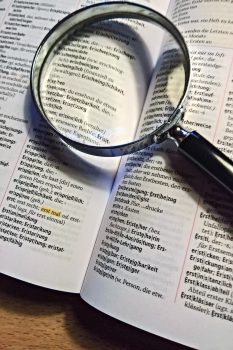3 Tips For Remembering German Plurals (Continued) Posted by Larissa on Feb 18, 2020 in Grammar, Language
As promised, I am continuing on from my last blog post, helping you remember the right grammar to use for plurals. I sometimes find German grammar overwhelming as there are so many rules, so I hope these bitesize tips will make German plurals easy for you!
If you haven’t seen my last blog post, you will find it here.
Let’s get started:
Tip 4: If it sounds English, add an “S” on the end of it.
In English we have it easy, for almost all words we can just add an “s” onto the end to make it plural. In German, if there is a word that sounds English, you can usually just add an “s” onto the end of it as well! There are also words taken out of French and Dutch where you can also stick an “s” on the end. Here are some examples:
die Kamera die Kameras
(the camera) (the cameras)
das Menü die Menüs
(the menu) (the menus)
die DVD die DVDs
(the DVD) (the DVDs)
die CD die CDs
(the CD) (the CDs)
der Park die Parks
(the park) (the parks)
Tip 5: Most masculine nouns end in -e, -e plus an umlaut, or do not change at all.
For example:
der Fluss die Flüsse
(the river) (the rivers)
der Tag die Tage
(the day) (the days)
der Koch die Köche
(the cook) (the cooks)
der Onkel die Onkel
(the uncle) (the uncles)
der Schuh die Schuhe
(the shoe) (the shoes)
der Hund die Hunde
(the dog) (the dogs)
der Schüler die Schüler
(the pupil) (the pupils)
Tip 6: If you are unsure about a plural, look it up using “Duden“.
Duden is an online dictionary that is super easy to use and very helpful. Type in the word and you will get the article, definition and synonyms. If you scroll down towards the bottom there is a table showing you the plural of the word and how the articles change depending on which case it is. You can try it out here
So there are three more tips to help you remember your grammar when using plurals! If you have any other interesting tips then let me know in the comments below.
Thank you for reading,
Larissa

Build vocabulary, practice pronunciation, and more with Transparent Language Online. Available anytime, anywhere, on any device.





Comments:
Joseph T Madawela:
very helpful thank you. I think that in German it is; ‘Sehr hilfreich danke’ I hope that is right
Larissa:
@Joseph T Madawela I’m glad you liked it Joseph! Yes you are correct 🙂